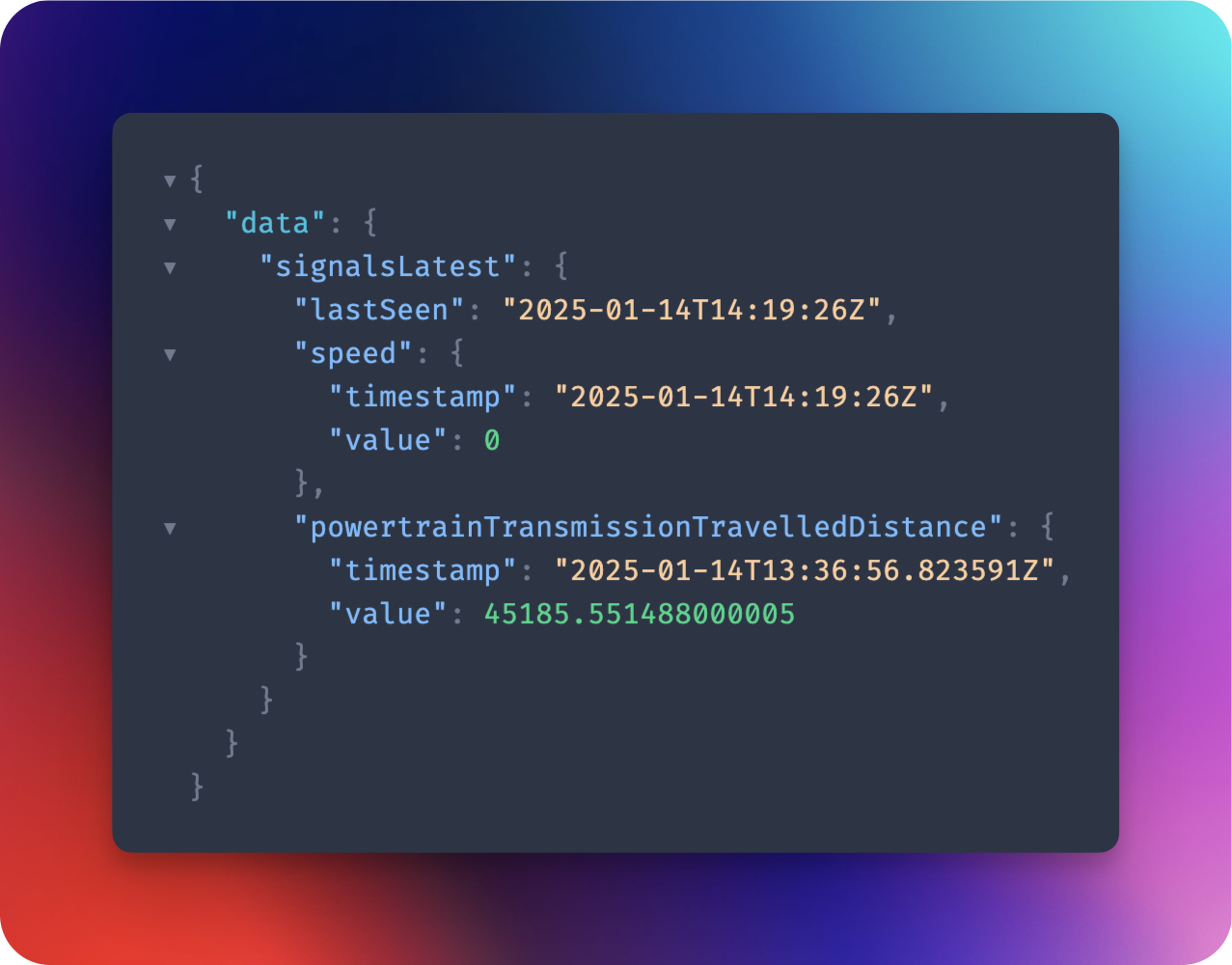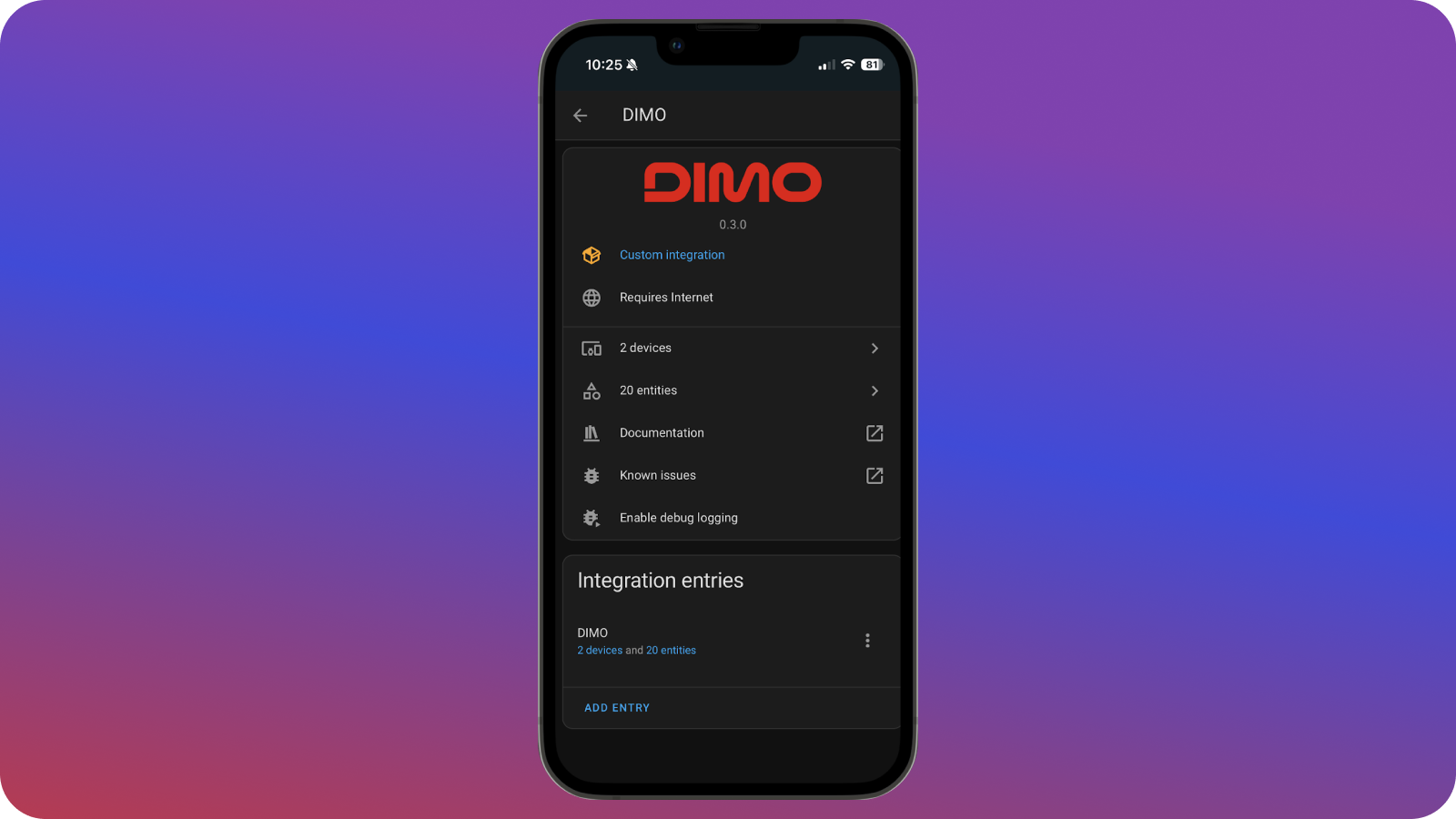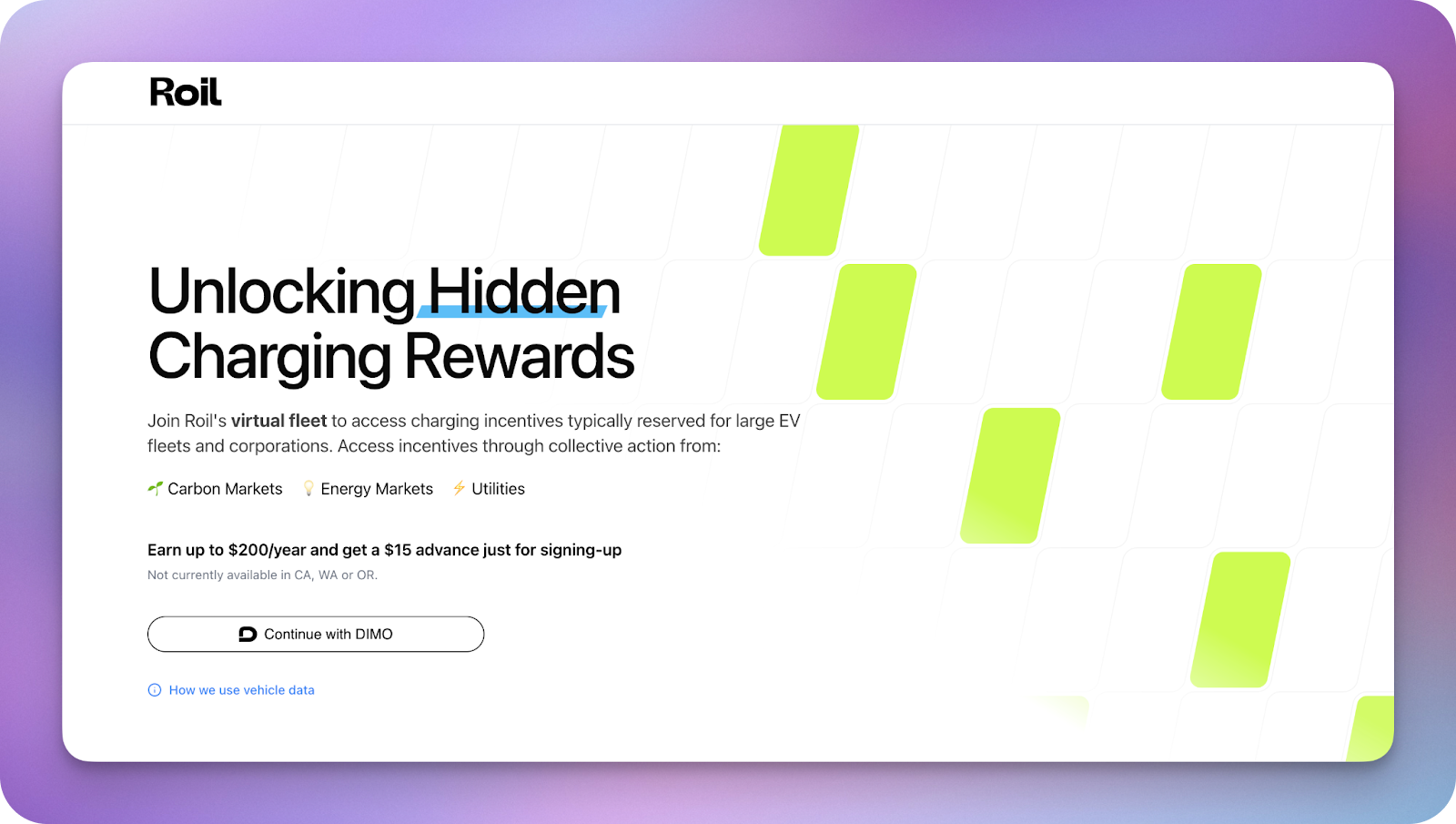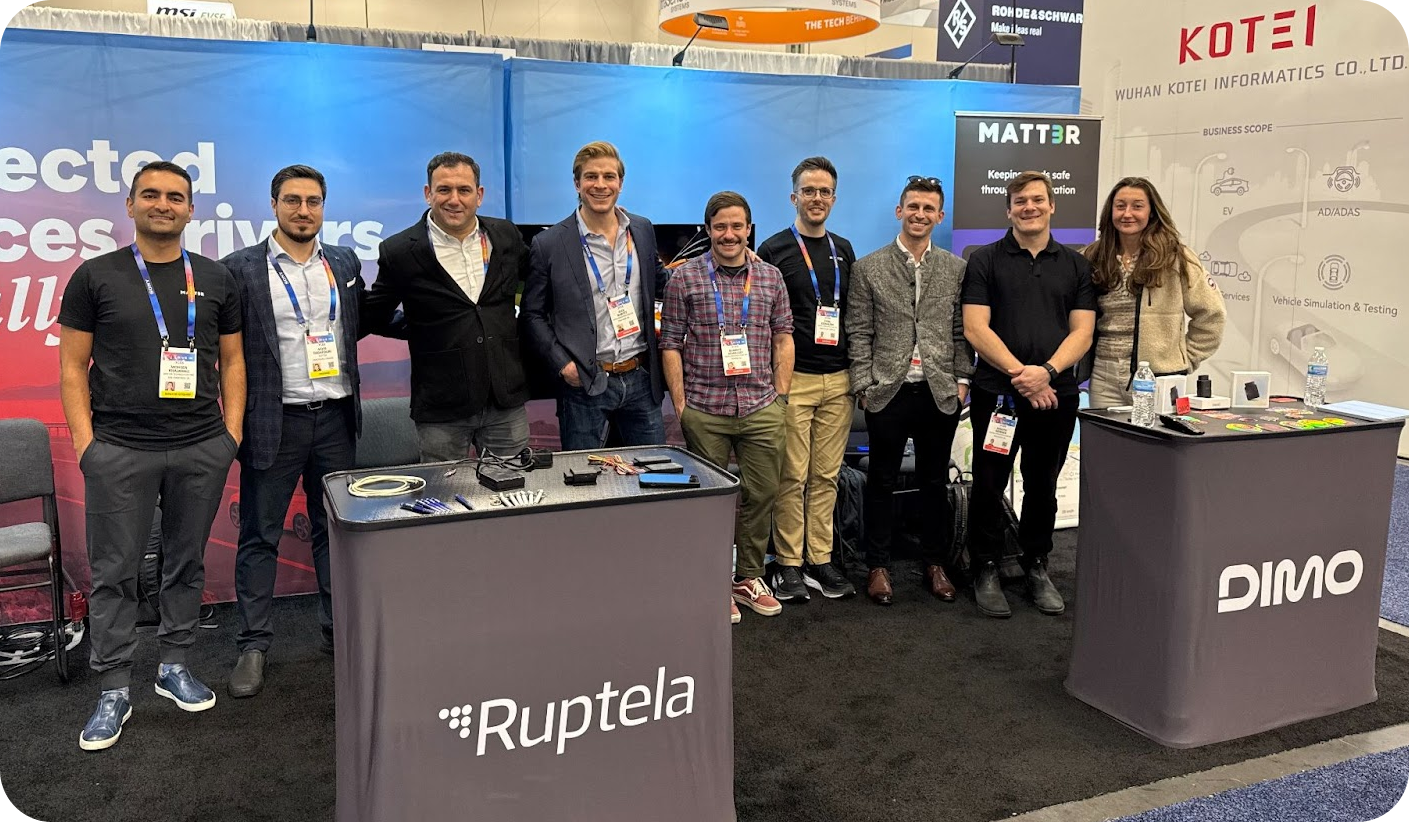Build On DIMO - January 2025
2025 Kicks Off
Happy new year builders! Hoping everyone had a restful holiday break – here at DIMO, we’re getting right back to it. 2025 is set to be a massive year for DIMO developers, and we’re not letting up on the gas anytime soon. We’ve seen explosive growth in the number of developers building on DIMO, as we’ve hit 146 developer licenses minted as of January 13th. This month, we’ve got a some important updates to be aware of, along with a closer look at what we’ve been up to over the past couple of weeks:
Developer Updates:
Updates to Token Exchange
Precise TimeStamps in Telemetry
Tire Pressure for More GM Vehicle
All the SDK Updates You Might Have Missed
2024 Project Spotlight:
Home Assistant
Stride
Roil
DIMO @ CES
⚙️ Developer Updates
Token Exchange: User Based JWT Deprecation
With the introduction of the new Login with DIMO Component & URL format for vehicle permission sharing, we are planning to no longer support User based JWTs to exchange for Vehicle JWTs. Instead, developers should now be using the Developer JWT (via your Developer License) to exchange for a Vehicle JWT. We will be formally deprecating support for token exchanging User JWTs to access vehicles on February 3rd, 2025. If your development environment still uses User JWTs for vehicle permissions, be sure to update before February 3rd. If you’re already using the Login with DIMO Component, no action is necessary on your end. You can read more about the different types of JWTs under the Authentication section of our docs.
Timestamp Changes Coming to Telemetry
An important update to timestamps is coming to the Telemetry API. Previously, timestamps were rounded in a way that could potentially impact precise time analysis. This latest update to the API will now return exact timestamps, starting from the specified interval. This change should be a nice quality of life improvement for anyone running applications that might require precise time analysis or real-time vehicle monitoring. We’re anticipating pushing these changes live on February 3rd, 2025, to give developers enough time to update their apps as needed.
For example, when querying vehicle data, you can now expect to send or receive precise timestamps in the following format: 2025-01-14T14:19:26Z

Tire Pressure Coming to GM Vehicles & R1 Firmware Updates
Next month, we’ll be rolling out enhanced tire pressure monitoring capabilities for most GM vehicles via a firmware update to R1 devices. This will give developers an additional layer of telemetry data and to access real-time tire pressure readings for an even larger number of vehicles. Builders, be ready to build the next generation of predictive maintenance apps with actual status of tires!
ICYMI: SDK Updates from December
Last month, we pushed several updates to a few of our SDKs, including the TypeScript Data SDK, Python Data SDK, and the Login with DIMO SDK. We’ve just started documenting these changes in a new Release Notes section in our docs, but here’s the quick rundown of what’s changed:
TypeScript & Python Data SDKs:
The TypeScript Data SDK now has support for CommonJS.
Both SDKs removed support for deprecated endpoints, including Device Data, Devices, Events, User, and Vehicle Signal Decoding.
Both SDKs have updated input parameters with updated JWT vocabulary, updating “access_token” and privilege_token” to “developer_jwt” and “vehicle_jwt”, respectively.
Removes a few endpoints from the Device Definitions API, and updates a few endpoints on the Valuations API.
Added easier ways to obtain a vehicle VIN with new shortcut functions.
Updated README documentation to incorporate these new changes.
Login with DIMO
There’s also now an expirationDate parameter in the Login with DIMO component that gives developers control over the length of time that a user is required to share their vehicle with their app. By default, this is set to 10 years – meaning that before the expiration date passes, developers should either notify users to extend their permissions for another year, or include the expirationDate parameter in the component to the date of their choosing. This information is always surfaced to the user when they choose to share their vehicles, so they’re aware of exactly how long they are choosing to provide permissioned vehicle access.
Additionally, the Login with DIMO component also received an update to allow users to either extend or revoke their permissions with your application. This not only gives users full, transparent control over their shared vehicle data, but also provides developers with an easier way to manage permission extensions as needed. To ensure you’re giving users the best experience, make sure that you update to the latest version of the Login with DIMO SDK.
Be sure to check out the full Release Notes page for more detailed information, as some of these could be considered breaking changes with the deprecation of a few different endpoints.
🛠️ Project Spotlight
With the increase of developers building on the DIMO Network, we thought we’d take the time to highlight some of the incredible projects that have been built over the last several weeks. We’re always welcoming new developers from across different industries to build on DIMO, so if you have an idea for a project, or just want to learn more about the process, come join us on Discord in the #build-on-dimo channel and say hello 👋.
DIMO Home Assistant Integration

Community developer @ardevd was one of the first to publicly launch a DIMO integration, which is now available on Home Assistant. This integration allows smart home enthusiasts to incorporate their vehicle data directly into their home automations, enabling scenarios such as garage door automation based on vehicle location or home climate control triggers based on your ETA. The app was built using the DIMO Python SDK, making it easy to get up and running quickly. If you haven’t gotten set up with the DIMO Home Assistant integration yet, go check it out over on Github.
Stride

One of the first integrations built by a (formerly) non-developer Scott Silver, Stride is currently building a smart vehicle maintenance application, giving users powerful insights to their car’s health. Within the dashboard, you’ll be able to visualize the status of your engine, oil, battery, brakes, and more. Additionally, you can choose to keep track of your vehicle service records directly from the Stride application, and see when it’s time to bring your car back into the shop. Stride has proven that even if you’re not an advanced developer, the Login with DIMO component and Data SDK make it super simple for just about anyone to get up and running quickly.
Roil

In case you haven’t already heard, DIMO has partnered up with Roil (“Replace Oil”) to allow Tesla drivers in 47 states earn additional yearly rewards just by connecting their vehicles. This works by tapping into carbon offset markets, allowing drivers who charge their Teslas at home to earn up to $200 a year. Roil uses the Login with DIMO SDK to enable vehicle sharing, which also includes the ability to set “compatible vehicles” via the vehicleMakes parameter. This means that as a developer, you have the option to include only certain vehicle makes (in this case, Tesla) based on your use case. Within a matter of weeks, the app gathered vehicle permissions from nearly 4,000 Teslas, including a fleet of over 1,000 vehicles.
💾 DIMO @ CES
Our team kicked off 2025 by attending CES in Las Vegas, where we were able to showcase the growing ecosystem of apps being built on DIMO and proudly share that, to date, we’ve amassed over 140,000 vehicles on the network. We were joined by our incredible partners at MATT3R, along with our R1 hardware manufacturing partner, Ruptela. The response from both developers and manufacturers has been overwhelmingly positive, highlighting an increasing demand for standardized, OEM-agnostic, and accessible vehicle data. We’ve only begun to scratch the surface, and we’re excited to see how these new partnerships will expand the possibilities for developers building on the network this year.

_____
Our team is always here to support developers in their journey as they build new applications using DIMO data. As always, feel free to reach out to us on the #build-on-dimo channel in Discord to share what you’re building, ask us questions, or collaborate with other developers in the growing community. And, don’t forget, our updated DIMO Ignite Grant Program is now live – if you haven’t checked it out already, now is the time!
Looking forward to building with you in 2025! 🤝
Barrett Kowalsky is on the DIMO Engineering team. Prior to working at DIMO, he developed the Python SDK for DIMO as a community contributor. A long-time crypto enthusiast, Barrett enjoys collaborating with other devs and coding for hours to some smooth lo-fi beats.